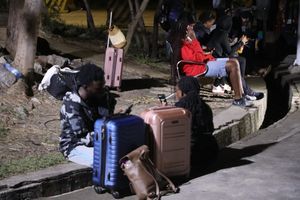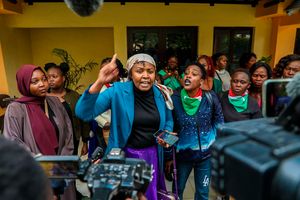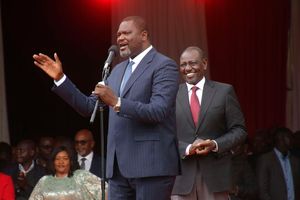
Opposition leaders heading to Kamukunji Grounds July 7, 1990.
Tension and a potential showdown are building up across major towns ahead of today’s Saba Saba commemoration, as the revolting youth escalate their battle for good governance.
The protests come 35 years after the inaugural Saba Saba pro-reform demonstrations on July 7, 1990, when the then “Young Turks” pushed President Daniel arap Moi to repeal Section 2A, ushering in the return to multi-party democracy.
Those protests were the culmination of sustained agitation for reforms and a fight against Kanu’s one-party dictatorship.
Although several decades have passed, the country continues to grapple with poor governance, corruption, abductions, extrajudicial killings and other ills, issues that have compelled the Gen Z, who were not yet born, to pick up the mantle in the fight for good governance.
Since the June 2024 protests, the list of demands by the Gen Zs has only grown. Their activism forced President William Ruto to reject the Finance Bill, 2024, and dissolve his Cabinet.
However, the President has since reneged on several other demands with growing cases of abductions and police killings further fuelling anger toward the Kenya Kwanza administration.
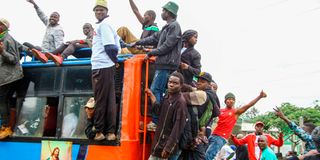
Kibera residents demonstrate on Ngong Road, Nairobi, on July 7, 2023.
Just like in the 1990 struggle for multi-party democracy, when dozens were killed by police defending the Kanu regime, today’s Gen Zs have paid the ultimate price. Some have been shot dead by police while others have suffered injuries from both law enforcers and hired goons.
What began as peaceful demonstrations against punitive tax laws has morphed into violent protests, allegedly infiltrated by goons some said to be sponsored by individuals in government and the opposition.
There are growing fears of violence ahead of the planned Saba Saba commemorations. Several learning institutions have announced they will remain closed due to concerns over possible chaos.
Some schools have asked parents to keep their children at home, while universities including Mt Kenya University (Nairobi Campus) and USIU-Africa have announced plans to conduct virtual learning on Monday.
Karatina Town, which has become the epicentre of anti-government protests in Nyeri County, experienced an unusually heavy police deployment on Saturday night.
Police officers patrolled the streets as business owners reinforced their premises with metal grills in anticipation of the Saba Saba demonstrations.
Fear and apprehension gripped the town as contingents of heavily armed officers prompted residents to head home early with businesses closed earlier than usual.
Based on past experiences of looting and destruction, some traders took extra measures to secure their properties. These included boarding up windows, reinforcing doors and erecting barricades.
“Last week’s protests led some residents to feel the need to secure their personal spaces. What began as a commemoration evolved into broader anti-government protests. In response, we decided to take proactive steps to reinforce our properties,” said George Maingi, an electronics shop owner.
“The primary motivation for reinforcing premises is to protect businesses from potential damage or looting. This is a pre-emptive measure to mitigate any impact from the protests,” added Margaret Njoki, a boutique owner.
Similar tension and anxiety has gripped other parts of the country, including Mavoko and Athi River in Machakos County.
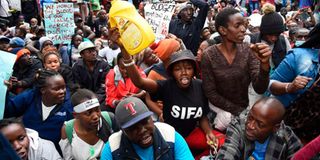
Kenyans protest outside the Office of the President in Nairobi on July 7, 2022, over the high cost of living.
Boniface Mutinda, a Mavoko youth leader said the recent protests have resulted in loss of lives, destruction, and looting—posing a serious threat to national security. “In every protest, we have witnessed casualties and property destruction. We urge youth to change their tactics in presenting their grievances. Mavoko youths will not be participating in any protests henceforth,” said Mr Mutinda.
Kitui Senator Enoch Wambua recalled that Saba Saba remains a significant reminder of Kenya’s fight for multi-party democracy and good governance.
“It was a push led by a mix of the old guard then referred to as the doyens of multiparty democracy and youthful leaders, fondly referred to as the Young Turks,” said Mr Wambua.
He noted that President Ruto, once a young Turk in the YK92 movement, had been part of a youth coalition opposing reforms and defending the Nyayo regime.
“Thirty-five years later, we have come full circle. The old guard and the Gen Zs are back on the streets, fighting against a return to the dark days. Today, Ruto is the face and leader of a clique drunk with power, determined to drag this country back to pre-1992 politics,” Mr Wambua said.
“The question for the Ruto administration is simple: how much longer can they rule with an iron fist? How much is enough before they realise Kenya is bigger than them? Profiling peaceful demonstrators and calling them anarchists will not solve anything. Issuing shoot-to-kill orders only deepens the bitterness,” he added.
Key figures in the 1990 struggle have publicly expressed support for the youth and their demand for better leadership.
The original Young Turks included veteran politician Raila Odinga (now allied with Dr Ruto), lawyer Gitobu Imanyara, Mukhisa Kituyi, Paul Muite, James Orengo, Njeru Kathangu, and Kiraitu Murungi. Others in the fight were Martin Shikuku, Masinde Muliro, Kenneth Matiba, and Charles Rubia.
The reform push also had strong support from outspoken religious leaders such as Ndingi Mwana a’Nzeki (Catholic Church), Rev Timothy Njoya (PCEA), and Anglican bishops David Gitari, Henry Okullu, and Alexander Muge, who all challenged Moi’s autocratic rule.
Siaya Governor James Orengo on Sunday rallied the youth to intensify their fight for good governance. He lamented that the gains of the past had been eroded by successive regimes, including Dr Ruto’s.
“The dream of Saba Saba was enshrined in the 2010 Constitution. But before the ink dried, it was turned on its head. Every pillar has since been weakened. Even the separation of church and state is under threat. The struggle must continue Mwakenya, Saba Saba, Gen Z on and on,” said Mr Orengo.
Although his party ODM recently signed a pact with Dr Ruto’s UDA, Mr Orengo remains a vocal critic of the government.
Mr Imanyara recalled the original fight for good governance during Moi’s regime and said the foundation they laid is now bearing fruit.
“We ended one-party rule by repealing Section 2A. We introduced term limits and laid the groundwork for the 2010 Constitution. I would not call the original Saba Saba a failure,” he said.
Rev Njoya who was once beaten by pro-government goons, condemned the current wave of abductions and extrajudicial killings of government critics.
“This government does not respect fundamental rights and freedoms as enshrined in the Bill of Rights,” he said.
He noted that the Constitution guarantees every Kenyan the right to assemble, demonstrate, picket and petition public authorities peacefully.
The youth, he said, are fighting for jobs, healthcare, proper use of public resources, and an end to corruption.
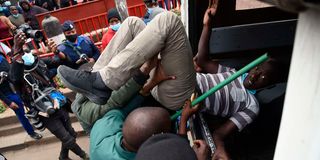
A protester is arrested in Nairobi during a demonstration against police brutality on July 7, 2021.
Mr Imanyara echoed the sentiment, calling the Gen Z uprising “the fruits of the seeds we planted.” “They have already had a greater impact than we did in the 1990s. They forced the President to withdraw a Finance Bill that had already been passed by Parliament. They also forced the Cabinet’s dissolution—and even secured a presidential apology, albeit a half-hearted one. For the first time since the 1982 coup attempt, the military was deployed to the streets,” he said.
Former detainee Wafula Buke also pledged to join the Saba Saba protests. “I will be in Nairobi to join the protests. Nothing has changed, even after our comrade Raila Odinga joined the Kenya Kwanza government, promising to end human rights violations like abductions, forced disappearances, and extrajudicial killings,” said Mr Buke.

